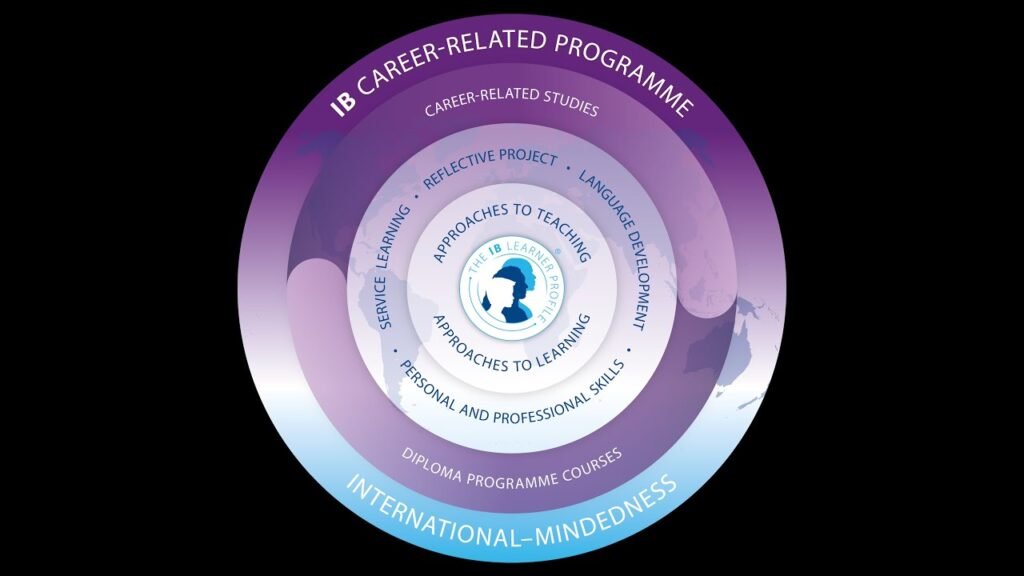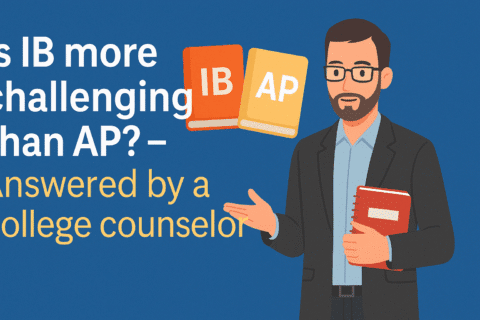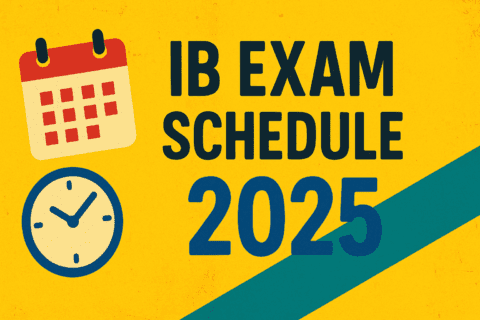At a time when an increasing number of young adults are questioning the necessity and value of four-year college degrees, the International Baccalaureate (IB) has introduced a relatively new entrant into the career education space that is gaining attention.
The IB’s Career-related Programme (CP) affords high school students a chance to blend academic study with specialist experiences and courses from a variety of technology companies, art schools, and other businesses, paving a pathway to career and vocational success.
The International Baccalaureate has been offering rigorous educational curricula since the 1960s. Between 2018 and 2022, the number of IB offerings grew by 34.2% worldwide, and as of October 2024, over 8,000 programmes were available at more than 5,800 schools in 160+ countries.
IB programmes first began to be offered in the United States in 1971, and as of November, there were 1,910 authorized IB World Schools across 48 states. According to a recent survey, the IB is currently educating over 785,000 students in the U.S, the vast majority of them in public school settings.
While most of those schools offer the Primary Years Programme (for students ages 3–12), the Middle Years Program (for students ages 11–16), or the best-known Diploma Programme (DP) for high school students, it’s the IB’s newest offering, the Career-related Programme, that holds particular promise, especially now when more concerns are being raised about the high cost of college, the relevance of four-year degrees, and the availability of good jobs that don’t require a college education.
The Career-related Programme, first offered in November 2014, is designed for students who are interested in career-related education but want to be prepared for choosing their best pathway among the options of additional higher education, apprenticeships or employment after graduation.
As of November, 2024, there were 404 schools offering the CP diploma globally, a gain of 47% since 2020. Currently, 183 schools provide the CP in the U. S., educating more than 8,400 students.
The CP involves a three-part educational framework consisting of courses from the IB’s Diploma Program, the CP core and career-related studies.
Students must complete at least two DP courses and the associated written examinations graded by IB examiners in any of its six subject groups — science, math, studies in language and literature, language acquisition, individuals and societies and the arts.
The CP core combines academic and practical skills in a manner intended to connect DP courses to career interests. It consists of four components:
- Personal and professional skills designed to develop attitudes, skills and strategies that can be applied to personal and professional situations;
- Service learning for the development and application of knowledge and skills towards meeting a targeted community need; and
- A reflective project involving an in-depth body of work produced over an extended period of time and completed near the end of the CP. Through the reflective project students are expected to develop sharper communication and analytic skills as they evaluate an ethical issue arising from their career-related studies.
- Language development ensures that students develop skills in a second language to further their understanding of the wider world. The ability to communicate in more than one language is essential to the IB’s concept of an international education.
Career-related Studies are designed to prepare students for higher education, an internship or apprenticeship, or a position in their field of interest. In that vein, IB collaborates with several companies and organizations that serve as career-education providers.
Several of these providers — known as CRS Strategic Providers — have signed formal cooperation agreements with the IB. They include Arizona State University (ASU), the Association of Chartered Certified Accountants, Microsoft, Pearson the Savannah College of Art & Design, and the World Academy of Sport (WAoS).
Each school can create its own unique version of the program, allowing a portion of the curriculum to prepare students for jobs in business and accounting, engineering, biomedical sciences, and art & design. Other industry providers that have worked with IB world schools on career-related studies include Adobe, Apple, Cisco, FEMA, Knowledge Matters, The National Center for Construction Education and Research, U.S. Soccer, and YouScience.
In order to offer IB curricula, a school must be authorized as an IB World School. As part of the authorization process, schools receive extensive training and consulting, and they must satisfy professional development requirements. They also pay initial authorization and annual costs associated with the program.
This year has seen new developments concerning the official recognition being given IB courses. For example, the American Council on Education recently recommended that colleges and universities award students at least 3 credits for IB scores of 4 or higher for the 20 courses it reviewed. (Students are given a course score between one and seven for IB exams; most universities require a score of “4” or “5” as the minimum for granting advanced placement or course credit).
In May 2024, 5,494 U.S. students took CP exams, representing a 31.91% increase from the previous year.
In addition, in Oregon, the legislature passed House Bill 4137, which mandates that students who complete the IB’s DP or CP satisfy the state’s high school graduation requirements. Several states already treat completion of the DP as equivalent to a high school diploma, but Oregon became the first to extend the same equivalency to the career program.
The Career-related Programme has taken the important step of integrating college preparation with career readiness. It combines the academic rigor of the DP with the development of specific employment-related competencies, showing that both aims can co-exist and be served within one curriculum.
That combo offers substantial postsecondary educational benefits to graduates. A 2018 study examined college enrollment and persistence patterns for all CP graduates from high schools in the U.S. between 2013 and 2015. It found that CP graduates enroll in college at higher rates (81%) than do all high school graduates nationally (68%). The study also revealed that CP graduates had higher first-year college persistence than did all high school graduates (89% versus 72%, respectively).
A more recent study on the graduating class of 2016 showed similar CP benefits. For example:
- Compared to the national postsecondary enrollment rate of 64%, this group of CP graduates had an enrollment rate of 72%.
- CP graduates enrolled more often than the national cohort at four-year institutions (55% vs. 43%).
- CP graduates averaged an 81% first-to-second-year persistence rate, compared to the national rate of 72%.
- CP graduates completed their degree in six years at higher rates than the national average (77% compared to 68%).
IB’s Career-related Programme offers students and school districts a chance to bridge the traditional academic vs. practical divide. As Joseph Lee, Superintendent of Palm Beach County Schools, said, “The CP really blended nicely with the career academies we already had in our district, over 270 of them. It was a perfect marriage for us, as it opens access to more students and gives us the opportunity to diversify our IB programmes.”
1. What is the International Baccalaureate Career-related Programme (IB CP)?
Answer:
The IB Career-related Programme (CP) is a specialized educational framework designed for high school students who seek a blend of academic study with career-related education. Introduced by the International Baccalaureate (IB) in November 2014, the CP allows students to engage in coursework from the IB Diploma Programme (DP) alongside practical studies related to their career interests. This combination prepares students for higher education, apprenticeships, or direct entry into the workforce, offering a versatile pathway tailored to individual career goals.
2. How does the IB CP differ from the IB Diploma Programme (DP)?
Answer:
While both the CP and DP are rigorous IB programmes, the CP focuses more on career-related education. The CP integrates at least two DP courses with specialized career-related studies, practical skills, and a reflective project. In contrast, the DP is a more traditional academic program aimed at preparing students for university education across a broad range of disciplines. The CP is ideal for students who want a more direct connection to specific career paths alongside their academic studies.
3. Who is the IB CP designed for?
Answer:
The IB CP is designed for high school students who are interested in career-related education and wish to combine academic studies with specialized vocational training. It is ideal for students who prefer a more applied approach to learning and want to prepare for specific career paths, apprenticeships, or immediate employment after graduation, while still maintaining the option to pursue higher education.
4. What are the main components of the IB CP curriculum?
Answer:
The IB CP curriculum consists of three main components:
IB Diploma Programme (DP) Courses: Students must complete at least two DP courses from any of the six IB subject groups, ensuring a strong academic foundation.
CP Core: This includes personal and professional skills, service learning, and a reflective project. The core aims to develop students’ personal growth, community engagement, and critical thinking skills.
Career-related Studies: These are specialized courses tailored to the student’s career interests, developed in collaboration with industry partners, providing practical and vocational training.
5. How many IB CP programmes are available worldwide as of 2024?
Answer:
As of November 2024, there are 404 schools worldwide offering the IB Career-related Programme, marking a 47% increase since 2020. This growth reflects the rising interest and recognition of the CP as a valuable pathway for career and vocational success.
6. How widespread is the IB CP in the United States?
Answer:
In the United States, as of November 2024, there are 183 schools offering the IB Career-related Programme. These schools educate over 8,400 students, contributing to the increasing popularity of the CP as an alternative to traditional academic pathways in public and private educational settings.
7. What are the benefits of completing the IB CP for students?
Answer:
Completing the IB CP offers several benefits, including:
- Career Readiness: Students gain practical skills and specialized knowledge relevant to their chosen fields.
- Academic Rigor: The CP maintains the high academic standards of the IB Diploma Programme.
- Higher Education Opportunities: CP graduates enroll in college at higher rates and demonstrate better persistence in higher education settings.
- Flexibility: Students can choose pathways that include further education, apprenticeships, or immediate employment.
- Skill Development: Emphasis on personal and professional skills, service learning, and reflective projects enhances communication, analytical, and ethical decision-making skills.
8. What are the entry requirements for the IB CP?
Answer:
Entry requirements for the IB CP vary by school but generally include:
- Academic Readiness: Demonstrated ability to handle the academic demands of the DP courses.
- Interest in Career-related Studies: A clear interest or intention to pursue a specific career path.
- School Authorization: Enrollment must be in an IB World School authorized to offer the CP.
- Application Process: This may involve submitting academic records, teacher recommendations, and personal statements, depending on the school’s specific requirements.
9. How does the CP core enhance student development?
Answer:
The CP core enhances student development through four key components:
- Personal and Professional Skills: Develops attitudes, strategies, and skills applicable to personal and professional contexts.
- Service Learning: Encourages students to apply their knowledge and skills to meet community needs, fostering social responsibility.
- Reflective Project: Involves creating an in-depth project that enhances communication and analytical skills while addressing ethical issues related to their career studies.
- Language Development: Ensures proficiency in a second language, promoting global understanding and communication skills.
10. What types of career-related studies are available in the IB CP?
Answer:
Career-related studies in the IB CP cover a wide range of fields, including:
- Business and Accounting
- Engineering
- Biomedical Sciences
- Art and Design
- Information Technology
- Health and Social Care
These studies are developed in collaboration with industry partners, allowing students to gain relevant, hands-on experience in their chosen fields.
11. Which organizations collaborate with the IB CP as career-education providers?
Answer:
Several prominent organizations collaborate with the IB CP as career-education providers, known as CRS Strategic Providers. These include:
- Arizona State University (ASU)
- Association of Chartered Certified Accountants (ACCA)
- Microsoft
- Pearson
- Savannah College of Art & Design
- World Academy of Sport (WAoS)
- Adobe
- Apple
- Cisco
- FEMA
- Knowledge Matters
- The National Center for Construction Education and Research
- U.S. Soccer
- YouScience
These partnerships ensure that the CP curriculum remains relevant and aligned with industry standards.
12. How does the IB CP prepare students for higher education and employment?
Answer:
The IB CP prepares students for higher education and employment by:
- Academic Foundation: Providing rigorous academic courses through the DP framework.
- Career-focused Training: Offering specialized studies and practical experiences aligned with career interests.
- Skill Development: Enhancing personal, professional, and analytical skills through the CP core.
- Flexible Pathways: Allowing students to choose between further education, apprenticeships, or immediate employment based on their career goals.
- Industry Connections: Facilitating internships and real-world experiences through partnerships with industry leaders.
13. What is the global reach of the IB CP as of October 2024?
Answer:
As of October 2024, the IB CP is offered in over 8,000 programmes at more than 5,800 schools across 160+ countries. This extensive global reach underscores the CP’s growing acceptance and its role in shaping career-focused education worldwide.
14. How has the number of IB offerings grown globally between 2018 and 2022?
Answer:
Between 2018 and 2022, the number of IB offerings grew by 34.2% worldwide. This significant growth reflects the increasing demand for IB programmes, including the CP, as educational institutions and students seek comprehensive and versatile educational pathways.
15. What recent legislative changes support the IB CP in the United States?
Answer:
In May 2024, the state of Oregon passed House Bill 4137, mandating that students who complete the IB DP or CP satisfy the state’s high school graduation requirements. This makes Oregon the first state to extend the equivalency of the CP to a high school diploma, similar to how several states already recognize the DP as equivalent.
16. How do IB CP graduates perform in higher education compared to national averages?
Answer:
IB CP graduates demonstrate superior performance in higher education compared to national averages:
- Enrollment Rate: 81% of CP graduates enroll in college, compared to the national average of 68%.
- Persistence Rate: 89% of CP graduates persist in their first year of college, versus 72% nationally.
- Degree Completion: 77% of CP graduates complete their degrees within six years, compared to the national average of 68%.
- Four-Year Institution Enrollment: 55% of CP graduates enroll in four-year institutions, higher than the national rate of 43%.
These statistics highlight the CP’s effectiveness in preparing students for successful postsecondary education.
17. What is the authorization process for schools to offer the IB CP?
Answer:
To offer the IB CP, schools must undergo an authorization process that includes:
- Application Submission: Schools apply to become IB World Schools authorized to offer the CP.
- Training and Consulting: Schools receive extensive training and consulting to implement the CP effectively.
- Meeting Requirements: Schools must satisfy professional development requirements and demonstrate the capacity to deliver the CP curriculum.
- Fees: Schools pay initial authorization and annual fees associated with the IB programmes.
- Evaluation: The IB conducts evaluations to ensure schools meet the standards required to offer the CP.
This rigorous process ensures that authorized schools provide high-quality CP education.
18. How does the IB CP support multilingual education?
Answer:
The IB CP emphasizes language development as a core component, requiring students to develop skills in a second language. This focus supports the IB’s mission of fostering international-mindedness and global communication skills. Proficiency in multiple languages enhances students’ understanding of diverse cultures and prepares them for global career opportunities.
19. What recent recognition has the IB CP received from the American Council on Education?
Answer:
The American Council on Education (ACE) recently recommended that colleges and universities award students at least 3 credits for IB scores of 4 or higher in the 20 courses it reviewed. This recognition acknowledges the academic rigor of the IB CP and facilitates advanced placement or course credit for CP graduates, enhancing their higher education prospects.
20. How has student participation in the IB CP changed recently in the U.S.?
Answer:
In May 2024, 5,494 U.S. students took CP exams, representing a 31.91% increase from the previous year. This surge in participation indicates growing interest and acceptance of the CP as a viable and attractive educational pathway among students and educators in the United States.
21. Can schools customize the IB CP curriculum?
Answer:
Yes, each IB CP-authorized school can create its own unique version of the program. Schools can tailor the career-related studies portion to align with specific industries or local economic needs, such as business and accounting, engineering, biomedical sciences, or art and design. This flexibility allows schools to offer relevant and specialized education that meets the interests and career aspirations of their students.
22. What impact has the IB CP had on public school settings in the U.S.?
Answer:
The IB CP has made a significant impact in U.S. public schools by providing a structured pathway that combines academic excellence with career readiness. With over 785,000 students currently educated through IB programs in the U.S., the CP adds value by addressing concerns about the high cost of college, the relevance of four-year degrees, and the availability of quality jobs that do not require a traditional college education. Public schools benefit from offering diverse educational options that cater to a wider range of student needs and career goals.
23. What does Joseph Lee, Superintendent of Palm Beach County Schools, say about the IB CP?
Answer:
Joseph Lee, Superintendent of Palm Beach County Schools, praised the IB CP by stating, “The CP really blended nicely with the career academies we already had in our district, over 270 of them. It was a perfect marriage for us, as it opens access to more students and gives us the opportunity to diversify our IB programmes.” This endorsement highlights the CP’s ability to integrate seamlessly with existing career-focused initiatives, expanding opportunities for students and enhancing the overall educational offerings.
24. How does the IB CP address concerns about the cost and relevance of college education?
Answer:
The IB CP addresses these concerns by offering an alternative pathway that combines academic rigor with vocational training, potentially reducing the need for a four-year college degree. By providing career-related studies, the CP equips students with practical skills and industry-specific knowledge that can lead directly to employment or apprenticeships, thereby lowering the financial burden associated with prolonged higher education. Additionally, the CP’s alignment with industry partners ensures that the education provided is relevant and meets the current demands of the job market.
25. What future trends are expected for the IB CP in the global education landscape?
Answer:
Future trends for the IB CP include continued global expansion, increased collaboration with industry partners, and enhanced recognition by higher education institutions. As more schools adopt the CP and as its benefits become widely recognized through studies and legislative support, the programme is expected to become a preferred choice for career-oriented students worldwide. Additionally, advancements in technology and evolving job markets will likely lead to further customization and specialization within the CP, ensuring that it remains relevant and effective in preparing students for future careers.




